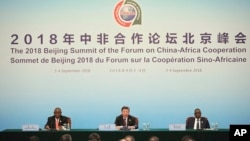Chinese authorities report that their nation is looking to strengthen ties with Africa through educational programs and the development of infrastructure on the continent through their Belt and Road Initiative (BRI).
The East Asian nation’s ministry of education said it looks to use programs such as the Confucius Institutes to promote cultural exchange, a key component to the BRI.
Wilma Hugo, a Confucius Institute Chinese Language Facilitator based in Cape Town, South Africa, said the program is providing opportunities to several Africans.
“We have a growing relationship with China, with business and all kinds of things,” said Hugo.
“They need translators, and we are actually starting to teach Mandarin in South Africa. It’s actually become part of the curriculum as of 2016. There are just so many opportunities when you do Mandarin,” she added.
Umesh Bawa, the director of International Relations at the University of Western Cape echoed Hugo’s sentiments.
“The Confucius Institute partnership is one with the Chinese universities and it’s a government program to be able to have a space where they’d be able to do conversations on policy, conversations on friendship and on culture and appreciation of that,” said Bawa.
“In South Africa we know that it’s really, really important. All over the world the Chinese in their history have always been very oppressed,” he added.
Experts report that Beijing’s educational programs are not limited to everyday students and add that last year, politicians from six African nations attended a new $40 million “leadership academy” that was opened by the East Asian nation in Tanzania, with the focus of providing knowledge on Chinese communist ideology.
Cobus Van Staden, an expert on Chinese affairs said western nations are rejecting China’s attempts to grow their communist influence in their nations, however African leaders do not share the opposing sentiments.
“Among African students, isn’t such a politically fraught issue in the global South as in the global North,” said Van Staden.
Van Staden added that China may be using the institute to promote its values.
“The Chinese government tends to be very unified and quite proactive in its messaging, particularly around issues like Taiwan and Tibet, so I can see how on the one hand it kind of amplifies that messaging, so if a university for example invites a Tibetan representative, then they might get push back from the Chinese embassy, but and now they might also get pushback from the Confucius Institute,” he said.
Liren Zeng, the co-director of the instate at the University of Western Cape expressed different views from those echoed by Van Staden.
“When we have a Confucius Institute, we would have a local co-director, and the local co-director would have control of all the curriculum and the activities, the events, so we abide by all the laws and rules and regulations of the local university, and our curriculum is heavily scrutinized by the local faculty,” said Zeng.
